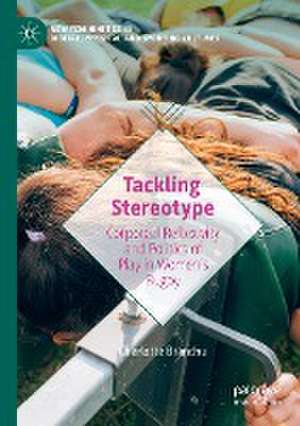Tackling Stereotype: Corporeal Reflexivity and Politics of Play in Women’s Rugby: New Femininities in Digital, Physical and Sporting Cultures
Autor Charlotte Branchuen Limba Engleză Paperback – 9 feb 2024
| Toate formatele și edițiile | Preț | Express |
|---|---|---|
| Paperback (1) | 775.96 lei 6-8 săpt. | |
| Springer International Publishing – 9 feb 2024 | 775.96 lei 6-8 săpt. | |
| Hardback (1) | 781.00 lei 6-8 săpt. | |
| Springer International Publishing – 9 feb 2023 | 781.00 lei 6-8 săpt. |
Preț: 775.96 lei
Preț vechi: 946.29 lei
-18% Nou
Puncte Express: 1164
Preț estimativ în valută:
148.50€ • 154.46$ • 122.59£
148.50€ • 154.46$ • 122.59£
Carte tipărită la comandă
Livrare economică 14-28 aprilie
Preluare comenzi: 021 569.72.76
Specificații
ISBN-13: 9783031167935
ISBN-10: 3031167937
Pagini: 211
Ilustrații: VII, 211 p.
Dimensiuni: 148 x 210 mm
Greutate: 0.27 kg
Ediția:1st ed. 2023
Editura: Springer International Publishing
Colecția Palgrave Macmillan
Seria New Femininities in Digital, Physical and Sporting Cultures
Locul publicării:Cham, Switzerland
ISBN-10: 3031167937
Pagini: 211
Ilustrații: VII, 211 p.
Dimensiuni: 148 x 210 mm
Greutate: 0.27 kg
Ediția:1st ed. 2023
Editura: Springer International Publishing
Colecția Palgrave Macmillan
Seria New Femininities in Digital, Physical and Sporting Cultures
Locul publicării:Cham, Switzerland
Cuprins
1. Introduction: Kicking off.- 2. Stereotypes that stick: moral economy and cultural politics.- 3. Understanding Participation: Dispositions, Situations, and (Infra)structures.- 4. Integrating the team: identity, becomings and careers.- 5. “The physical side”: Getting a feel for the game - pains and pleasures of play.- 6. The ‘social side’: rugby culture, reflexivity and the space of women’s rugby.- 7. Influencing the field: tactics and politics of play.- 8. Conclusions: Politics of play and pragmatic politics.
Notă biografică
Charlotte Branchu is a Lecturer in Sociology at the University of Liverpool, UK.
Textul de pe ultima copertă
This book presents a critical rethinking of assumptions that have informed our understanding of women’s engagement in contact sport, based on an in-depth ethnography with an English rugby team. Looking at the day-to-day concerns of women who play rugby, this work provides a refreshing perspective on different ways of doing femininities in postfeminist times. Women’s rugby is one of the world’s fastest growing sports, yet it is also a physical game that is traditionally the preserve of men. Tackling Stereotypes reveals the cultural and symbolic stigma that ‘sticks’ to women’s rugby players and the tactics they use to carve out space for themselves and fight for legitimacy. It also argues that players engage in pragmatic politics, informed by their participation, that aims to enact realistic change. Branchu develops a situational sociology that furthers debates in the understanding of gender, belonging, becoming, embodiment, resistance politics, and the sociological study of sport.Charlotte Branchu is a Lecturer in Sociology at the University of Liverpool, UK.
Caracteristici
Reflects on experiences in the field through ethnographic vignettes, interview excerpts, and document analyses Contributes to methodological debates in the qualitative study of sport Illustrates the tension between individualised and collective articulations for feminist change and postfeminism








